|
|
|
Sort Order |
|
|
|
Items / Page
|
|
|
|
|
|
|
| Srl | Item |
| 1 |
ID:
118661
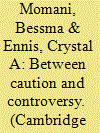

|
|
|
|
|
| Publication |
2012.
|
| Summary/Abstract |
The history of Gulf donorship, its trajectory and underlying motivations, continues to be an understudied aspect of foreign aid. While the Gulf Arab states are not new donors, their manner of regional coordination, branding, and aid management are distinct. Often helping fellow countries of the South, particularly Arab and Muslim countries, these countries have moved towards stronger private sector involvement and into social spending programmes. Owing to their oil wealth, Gulf Arab states' are increasingly generous and yet they are also cautious after 9/11 about how and by whom their aid is channelled. Nevertheless, with oscillations in oil prices, continued controversy over rising Islamism post-Arab-Spring, the future of Gulf aid remains a valuable subject of study.
|
|
|
|
|
|
|
|
|
|
|
|
|
|
|
|
| 2 |
ID:
154637
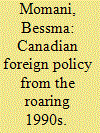

|
|
|
|
|
| Summary/Abstract |
As a field of study, Canadian Foreign Policy has undergone dramatic changes over the last three decades, becoming disconnected from debates about our identity and values and more focused on Canadian foreign and defence policy. This transition in Canadian Foreign Policy reflects the changing priorities of successive Canadian governments and structural shifts in Canadian academia. Yet, such change has unfolded gradually and incrementally, such that key challenges remain for scholars interested in working, presenting, and publishing in Canadian Foreign Policy. Using my own experiences as a student and teacher of foreign policy in Canada, I reflect on these transformations within Canadian Foreign Policy and their implications, beginning with the “golden age” of Canadian Foreign Policy during the 1990s to its decline under the Harper government and, finally, to our current climate of fragmented academic and professional research. In the current climate, participating in traditional and “new” social media places professional incentives (namely, tenure and promotion via peer-reviewed outlets) in tension with emerging opportunities to engage in more open critical analysis of Canadian Foreign Policy.
|
|
|
|
|
|
|
|
|
|
|
|
|
|
|
|
| 3 |
ID:
108046
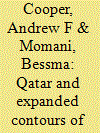

|
|
|
|
|
| Publication |
2011.
|
| Summary/Abstract |
It is increasingly obvious that Qatar is playing above its weight in the international role. There is no one script that defines Qatar's diplomatic role. It is best seen as a maverick, willing to work with the US as well as Hamas, Hezbollah and Iran. It operates a complex form of public diplomacy via Al-Jazeera and other high profile initiatives at the same time as it mediates behind the scenes with Israel and Lebanon. Qatar's role as a unique hybrid diplomatic actor is reinforced by the enthusiastic support it displayed towards the revolutions in Tunisia, Egypt and Libya, including operational support for the UN Security Resolution to place a no-fly zone with respect to the Qaddafi's regime, while being more circumspect on the uprising in Bahrain. Such an extensive, unconventional and differentiated approach creates risks as well as opportunities. Yet, through a combination of resources and vision, it is skilled resilience not vulnerability that defines Qatar.
|
|
|
|
|
|
|
|
|
|
|
|
|
|
|
|
| 4 |
ID:
130703
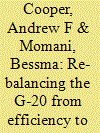

|
|
|
|
|
| Publication |
2014.
|
| Summary/Abstract |
This article contributes to the literature on global governance, legitimacy, and small states through a detailed analysis of the Global Governance Group. It examines in particular the operational impact and wider conceptual implications of the 3G's collective diplomatic efforts on the Group of 20. By engaging in a reconfigured form of informal multilateralism, the article finds that the 3G has been and is capable of shaping the global agenda with respect to the G-20 in a way that is both more inclusive and connected with existing institutions, especially the United Nations. Through this initiative, this group has effectively recalibrated the existing narrative about small states, the G-20, and global governance-shifting it from the paradigm of efficiency to one of legitimacy.
|
|
|
|
|
|
|
|
|
|
|
|
|
|
|
|
| 5 |
ID:
123540
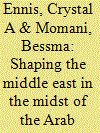

|
|
|
|
|
| Publication |
2013.
|
| Summary/Abstract |
While the Middle East and North Africa ( mena ) are undergoing rapid change, many domestic, regional and international actors are vying for space and influence as systems and customs evolve and adopt new forms. This paper characterises and compares the evolving foreign policy strategies of two such regional actors, Turkey and Saudi Arabia. It further assesses the motivations and activities of and challenges to Turkish and Saudi involvement throughout the region since the Arab uprisings. Ultimately these cases provide intriguing insight into the foreign policy purpose and methods of emerging states under conditions of uncertainty.
|
|
|
|
|
|
|
|
|
|
|
|
|
|
|
|
|
|
|
|
|